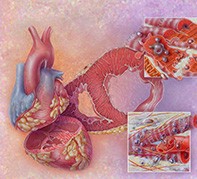Peer Reviewed
Feature Article Cardiovascular medicine
Managing heart failure: the key role of the GP
Abstract
Management of most patients with heart failure occurs at an outpatient level, with the GP playing a central role in initial diagnosis, counselling, regular assessment of fluid status, titration and monitoring of medications and end-of-life care.
Key Points
- Heart failure (HF) should be considered in all older patients presenting with a new wheeze.
- Patients with severe acute decompensated HF (ADHF) are best managed in hospital; those with mild decompensation or chronic compensated HF are often managed as outpatients by their GPs.
- The first priority in patients with ADHF is achievement of a euvolaemic state (via diuretics and fluid intake restriction).
- Medications of use in patients with systolic HF are diuretics, ACE inhibitors/angiotensin receptor antagonists, beta blockers, aldosterone receptor antagonists, ivabradine and digoxin.
- Apart from diuretics, no specific drug therapies have been shown to be consistently of benefit in patients with diastolic HF, the type of HF usually present in elderly patients.
- Renal dysfunction is common in HF. Assessment of volume status, peripheral perfusion and recent changes in drug therapy should guide management.
Picture credit: © Kevin Somerville.
Purchase the PDF version of this article
Already a subscriber? Login here.

